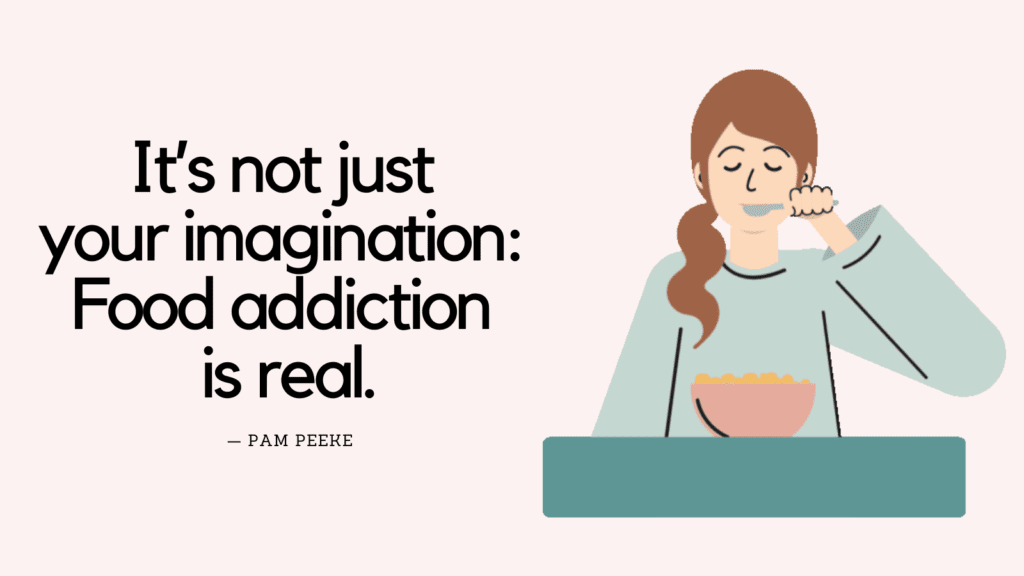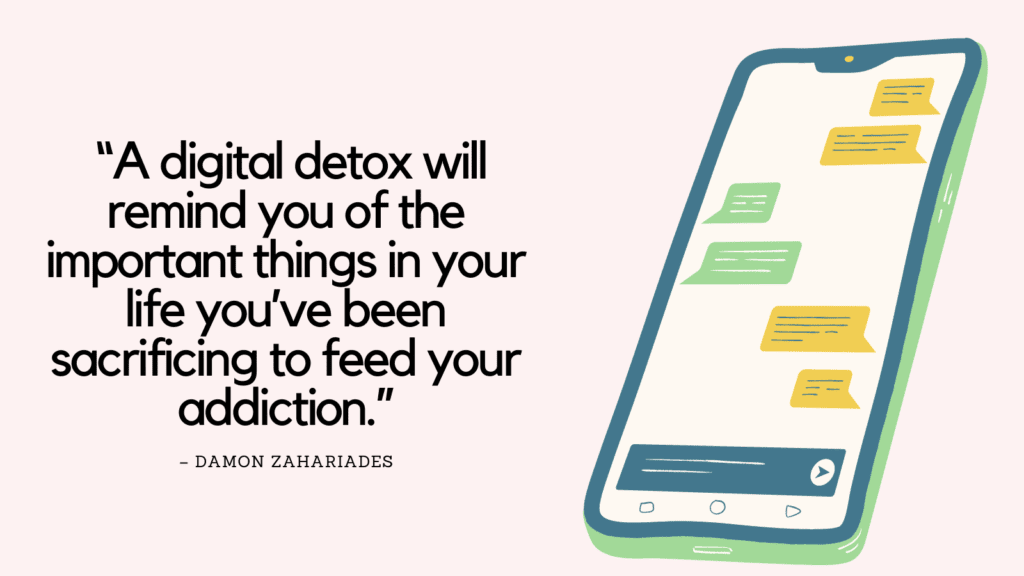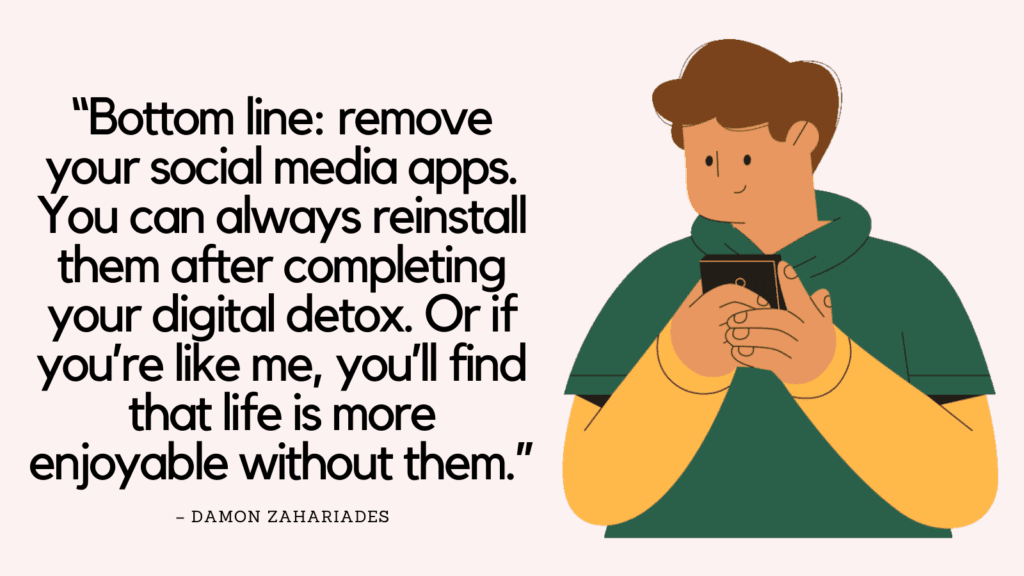This post contains some of the best food addiction quotes.
What Is Food Addiction?
Food addiction is a relatively recent concept in the field of psychology and refers to a problematic relationship with food that shares similarities with substance addiction.
It is characterized by a loss of control over eating behaviors, compulsive overeating, and a strong desire or craving for specific types of food, particularly those high in sugar, fat, or salt.
Here are some key factors associated with food addiction:
1. Neurobiology
Research suggests that certain foods, especially those rich in sugar, fat, and salt, can activate reward centers in the brain, leading to the release of dopamine, a neurotransmitter associated with pleasurable feelings.
Over time, this can result in tolerance and dependence, similar to the effects of drugs.
Related: Best 13 Food Addiction Books
2. Emotional Eating
Food addiction often coexists with emotional eating, where individuals use food as a coping mechanism to manage stress, negative emotions, or as a source of comfort.
This emotional reliance on food can contribute to the addictive patterns.
3. Cravings and Withdrawal Symptoms
Individuals with food addiction may experience intense cravings for specific foods or feel anxious or irritable when attempting to cut back or eliminate certain foods from their diet.
These withdrawal-like symptoms can make it challenging to break free from the addictive cycle.
4. Loss of Control
Like other forms of addiction, food addiction involves a loss of control over eating behaviors.
People may find themselves repeatedly engaging in binge-eating episodes or consuming large quantities of food, despite the negative consequences it has on their physical and mental health.
It’s important to note that food addiction is not officially recognized as a diagnosis in the Diagnostic and Statistical Manual of Mental Disorders (DSM-5), which is widely used by mental health professionals.
However, many psychologists and researchers are actively studying this phenomenon to better understand its underlying causes and effective treatment approaches.
Related: Best 12 Sugar Addiction Books
Food Addiction Quotes
1. “It’s not just your imagination: Food addiction is real.”— Pam Peeke
2. “Food addiction is real, but it’s not a binary construct. It’s not an either/or proposition that we’re either food addicts or not food addicts. Instead, there are gradations; it’s a continuum.”—Susan Peirce Thompson
3. “We have to treat food addiction as we would any other life-threatening addiction—we have to resist addictive foods with every fiber of our being and recommit to that fight on a daily, hourly, minute-to-minute basis. Vigilance is imperative to the recovery process.”—Pam Peeke
Related: Top 19 ED Recovery Quotes
4. “Is everyone who eats too much a food addict? No. But the question of where to draw the line between behaviour that merely indicates the enjoyment of food at one end of the spectrum, and behaviour that is symptomatic of someone suffering the persistent and annoying cravings spurred by addiction at the other end, is a difficult one to answer.”— Vera Tarman
5. “Recovery from food addiction can be complicated. Hard-core drug addicts actually have it easier than people who struggle on their own with food addiction. Why? Because drugs, cigarettes, and alcohol are not needed for survival. Once you get clean, you never touch the substance again. You are abstinent for the rest of your life.”—Pam Peeke
6. “Food addiction is a disorder related to this fundamental level of desire.”—Vera Tarman
Related: Top 21 Body Dysmorphia Quotes That Will Make You Feel Less Alone
7. “Food addiction easily slips under the radar: obesity, diabetes, high blood pressure, and depression are all consequences of food addiction, but they are usually identified by their individual symptoms rather than by the underlying cause.”—Vera Tarman
8. “But there is another reason food addiction is so tenacious. Most of us have a part of ourselves that really wants to eat addictive foods. Not just our brain, which has been rewired to crave them, but a part of our psyche that may have been using food for years to navigate stress, to reward, to celebrate, to comfort, to soothe. That part of us is called the Food Indulger.”—Susan Peirce Thompson
9. “The harsh reality with food addiction is that abstinence from all food is not an option. You must walk among your “drugs” every day of your life. You cannot escape them, no matter where you go.”—Pam Peeke
10. “Food addiction does not discriminate—it can afflict people anywhere along their weight-management journey.”—Pam Peeke
Related: Top 5 Body Dysmorphia Exercises (Cognitive Behavioral Therapy For BDD)
11. “If food addicts could smoke or inject sugar, food addiction would be on the same playing field for researchers as cocaine or heroin.”—Vera Tarman
12. “If you are sure you have no food addictions—be it to sweets, meats, breads, or anything other than healthy vegetables and fruits— then go completely cold turkey from your favorite foods for one week (or one month). Maybe you’re not as free as you thought you were.”— Michael L. Brown
13. “I do understand the power of addictions, especially food addictions. I’m simply urging you to stop making excuses, to stop avoiding reality, to stop blaming others, and to take responsibility for where you find yourself.”—Michael L. Brown
14. “Food addiction exists. Although the science that supports it is still in its infancy, it may be useful to remind the critical reader that addiction research in general, whether for alcohol, cocaine, Ecstasy, or opiates, is at a similar early stage.”—Vera Tarman
Related: Positive Body Image Quiz (+Best 12 Tips On How To Improve Your Body Image)
15. “Certainly, people suffering from eating disorders and food addiction can also be obese, but their primary condition is not obesity. In their case, obesity is just another symptom of their emotional disturbance or their food addiction. The underlying emotional trauma that drives the bulimic to stuff himself needs to be addressed before the physical aspects of obesity can be treated; likewise, the sugar that is propelling the addictive overeater needs to be removed before tackling any weight issues. ”— Vera Tarman
16. “Just as for any addiction, there are consequences related to food addiction that impact your life and the lives of your friends and family members. People with food addiction often experience depression related to their eating behaviors. If you have a food addiction, you may be more prone to health problems, stress, difficulty sleeping, digestive problems, fatigue, and thoughts of suicide due to hopelessness about your food addiction. You may also have higher risks for high blood pressure, type 2 diabetes, high cholesterol, heart disease, and certain cancers. You may experience pain from arthritis in your joints if you are overweight or obese, and you may also have sleep disorders related to your weight.”— Carolyn Coker Ross
17. “You may see your food addiction as an overwhelming problem. You may even have tried to address the problem by making promises to yourself or trying to avoid your food fixes completely. Usually these approaches work for a short time but not in the long run. For freedom from food addiction in the long run, you have to take a closer, deeper look at what’s driving your addiction and understand that fundamentally, addiction is not really about a substance or a behavior—it’s about something more.”—Carolyn Coker Ross
Related: How To Break Emotional Eating? Top 8 Powerful Ways To Stop Comfort Eating
18. “When you’ve endured a long period of food addiction, you’ve likely had this experience: You’re really “good” on a “diet” for a while, and then you’re placed in a stressful situation—you have a crushing work deadline or your mom goes into the hospital or you and your partner have a big blowup. Kaboom, your stress hormone levels hit the ceiling, you’re blinded by anxiety, and then the three horsemen of the apocalypse show up: helplessness, hopelessness, and defeat.”—Pam Peeke
19. “First, for people without food addiction, eating normal amounts of food provides enough pleasure, and overeating occurs only on occasion (Thanksgiving, for example). But if you have a food or eating addiction, you may not feel the same amount of pleasure when you eat normal quantities of food, or when you eat foods that are not your “food fixes”—that is, those foods that you crave and have difficulty controlling.”—Carolyn Coker Ross
20. “Kicking food addiction is hard. You need fuel for the journey. That fuel is your true hunger—the passion that drives you to pay attention to yourself, the motivation that inspires you, the goal you can see with crystal clarity; in other words, what your soul really aches for instead of the food coma. Your Healthy Hunger.”—Pam Peeke
21. “Healing from food addiction involves a lot of sacrifice and embodying a new way of living, including new daily routines. And typically, people don’t invest that heavily in something unless there’s a rationale and motivation for it. Thinking of yourself as a food addict very gratefully living in recovery can help fuel and sustain that recovery. I have seen so many people’s lives blossom once they embraced, without judgment or stigma, that they really were food addicts.”—Susan Peirce Thompson
Related: What NOT To Say To Someone With An Eating Disorder? (& What to Do Instead)

Food Addiction vs. Binge Eating
Food addiction and binge eating are related concepts but have some important distinctions.
While they share similarities in terms of overeating and loss of control, there are some key differences between the two:
1. Behavioral Patterns
Binge eating disorder is characterized by recurrent episodes of excessive food consumption accompanied by a feeling of loss of control. It involves consuming large amounts of food within a relatively short period, often leading to discomfort or distress.
Food addiction, on the other hand, refers to a problematic relationship with food similar to substance addiction, where individuals may be preoccupied with specific types of foods, experience cravings, and struggle with compulsive overeating.
Related: Best 10 Binge Eating Books
2. Emotional Factors
Binge eating is often driven by emotional factors, such as using food as a way to cope with negative feelings or to seek comfort. It is considered an eating disorder and may be associated with emotional dysregulation.
Food addiction, while it may also involve emotional eating, focuses more on the neurobiological aspects of addiction, such as the reward and pleasure centers in the brain.
3. Diagnostic Classification
Binge eating disorder is recognized as a diagnosable mental health condition in the DSM-5. It includes specific criteria related to the frequency and severity of binge-eating episodes, along with associated distress and impairment.
Food addiction, as previously mentioned, is not yet recognized as a distinct diagnosis in the DSM-5, although research in this area is ongoing.
Related: What Triggers Eating Disorder Relapse? (Top 3 Triggers)
4. Treatment Approaches
Treatment for binge eating disorder typically involves a combination of psychotherapy, such as cognitive-behavioral therapy, and sometimes medication. The focus is on addressing emotional triggers, developing healthier coping mechanisms, and improving one’s relationship with food.
For those struggling with food addiction, treatment approaches may draw from addiction models and include counseling, support groups, and strategies to manage cravings and develop healthier eating habits.
Conclusion
It’s worth noting that some individuals may experience both binge eating and food addiction simultaneously or at different times.
If you suspect that you may be struggling with either or both of these issues, it is recommended to seek professional help from a psychologist or mental health professional who specializes in eating disorders or addictive behaviors.
They can provide a comprehensive assessment and guide you through an appropriate treatment plan tailored to your specific needs.



